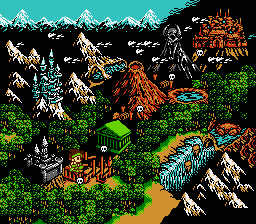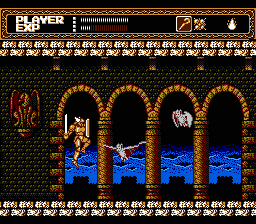Remember my old PAVC idea? I have been thinking about it again. As a refresher, this idea concerns efficiently and losslessly compressing RGB video frames output from an emulator for early video game systems such as the Nintendo Entertainment System (NES) and the Super NES. This time, I have been considering backing off my original generalized approach and going with a PPU-specific approach. (PPU stands for picture processing unit, which is what they used to call the video hardware in these old video games systems.) Naturally, I would want to start this experiment (again) with my favorite — nay — the greatest video game console of all time, the NES. Time for more obligatory, if superfluous, NES screenshots.

Little Samson, all-around awesome game
Here’s the pitch: Modify an emulator (I’m working with FCE-Ultra) to dump PPU data to a file. Step 2 is to take that data and run it through a compression tool. What kind of data would I care about for step 1? On the first frame, dump out all of the interesting areas of the PPU memory space. This may sound huge, but it is only about 9-12 kilobytes, depending on the cartridge hardware. Also, dump the initial states of a few key PPU registers that are mapped into the CPU’s memory space. As the game runs, watch all of these memory and register values and log changes. This really isn’t as difficult as it sounds since FCEU already cares deeply when one of these values changes. When something changes, mark it as “dirty” and dump that value during the next scanline update.
With that data captured, the next challenge is to compress it. I am open to suggestions on how best to encode this change data. I would hope that we could come up with something a little better than shoving a frame of change data through zlib.
Decompression and playback would entail unraveling whatever was performed in step 2 above. Then, the decoder simulates the NES PPU by drawing scanline by scanline, and applying state change data between scanlines.
What are the benefits to this approach? Ideally, I am aiming not only for lossless compression, but for better compression than what is ordinarily achieved with the large files distributed via BitTorrent and coordinated at tasvideos.org. When I first started investigating this idea over 2 years ago, MPEG-4 variants were still popular for compressing the videos. These days, H.264 seems to have taken over, which performs much better, even on this type of data (allegedly, H.264’s 4×4 transform allows for lower artifacts on sharp edge data such as material from old video game consoles).

Sword Master, mediocre game with great graphics
There are also some benefits from the perspective of NES purists. The most flexible NES emulators allow the user to switch palettes in order to get one that is “just right”. A decoder for this type of data could offer the same benefits.
Of course, an encoder is not much use without an analogous decoder that end users can easily install and use. I think this is less of an issue due to the possibility of creating a decoder in Flash or Java.




